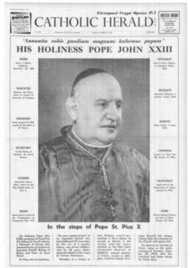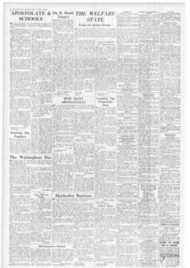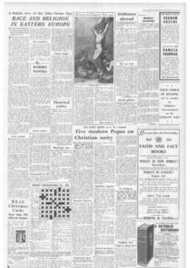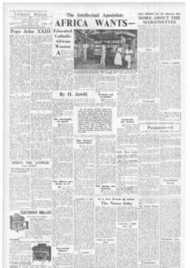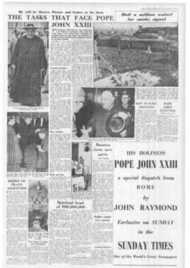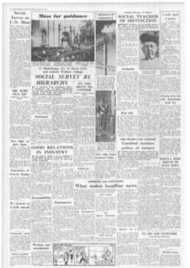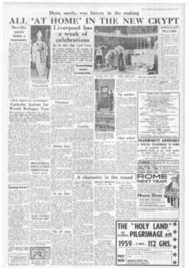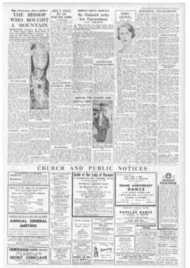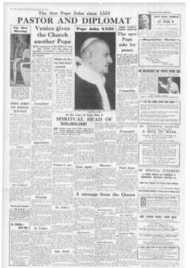Page 3, 31st October 1958
Page 3

Report an error
Noticed an error on this page?If you've noticed an error in this article please click here to report it.
Tags
Share
Related articles
World Offers Thanks For The Life Of The Most-travelled...
Poland And Russia
Attack On The Belgian Monarchy Catholic Profiles: 6
Rest Of The News
Letters To The Editor The Question Of C.e.g.
RACE AND RELIGION IN EASTERN EUROPE
By ROBERT NO WELL
POLAND AND GERMANY, by Jedrzej Giertych (Jedrzej Giertych, 16 Belmont Road, London, N.15, 7s.).
TWO major obstacles stand in the way of the reunification of Germany: the first, apparently the. greater. is the fact that since 1945 the eastern half of the country has been under Communist domination and that the reunion of this zone with the German Federal Republic would almost certainly mean. if it occurred now or in the near future. the loss to Soviet Russia of a sizeable slice of her European empire.
The second, which is much more deep-seated and which would thus be the one on which any negotiations would almost certainly break down if they succeeded in surmounting the first, is the question of those territories to the east of what is now the Soviet Zone which remained under German rule between the end of the first world war, when Poland was reestablished, and the beginning of the second, and which were given to Poland in 1945 by the Allies.
This was done quite deliberately to remove one of the major causes of tension in that area: the anomaly ot East Prussia and the Polish corridor (which mean that Germans going from Germany to Germany had to pass through Poland, and that the Poles had in effect two separate frontiers with Germany); the fact that Poland's natusal Baltic port, Danzig, was a free German city; the uneasy division of Upper Silesia (basically one large industrial district like the Ruhr) between Poland and Germany; and the long straggling frontier.
The new frontier was fixed along the Oder and the western Neisse, giving Poland the shortest possible border between the Baltic and Czechoslovakia. German territory to the east of this line was given to Poland. including not merely One Baltic port but two. Danzig and Stettin. except for the eastern part of East Prussia around Konigsberg which the Russians took for themselves.
Most of the Germans living in this area were expelled: this was because the existence of national minorities in Eastern Europe. and especially German minorities who had been such a nuisance in the period between the wars. was felt to be intolerable.
Never ratified
THIS settlement, agreed upon by the victorious Allies, has never been formally ratified in a German peace treaty: which gives those Germans expelled from their homelands cause to hope that, when eventually the future of Germany is settled, they may be allowed to return.
Mr. Giertych's book comes as a welcome reminder of the intensity of Polish feeling on this question. h is undoubtedly the best statement of the Polish side of the question available in English, and it is all the more opportune in that Western Germany is now the blue-eyed boy of Europe while Poland is suspect on account of her being under Communist domination.
Mr Giertych concedes nothing. He argues that these territories arc historically and geographically part of Poland; that ethnically the population is basically Polish for the most part. though Germanised through the deliberate policy of Prussia; that legally the area forms part of Poland, although there has never been a formal German peace neaty; and that anyway it would be impossible to reverse the present position without far more upheaval and chaos than could ever he justified
Now, it is all very well to argue that Silesia, for example. is historically and ethnically part of Poland and should therefore be within the boundaries of that nation. But it is a dangerous argu
ment to use, especially if. as is necessarily the case with Poland, the history has to go back for at least two centuries to the time before the successive partitions of the country; and it is suspiciously similar to the reasons advanced by the late Adolf Hitler for fresh German territorial acquisitions.
The expulsions If becomes even more suspect when one realises that most of the German population in these territories were forcibly expelled with considerable brutality. (The fact that the Germans had themselves shown equal or worse brutality does not justify such a crime, although it makes it understandable.)
Some. particularly in East Prussia. were deported by the
Russians to Siberia, and those who survived were not allowed to return home but were dumped in East Germany; othesa, whose territory was occupied later, were expelled by the Poles in an operation described euphemistically as a "transfei of populations"
This was all the more unjust in that in the archdiocese of Breslau, for example. many German Catholics welcomed the news that Silesia was to form part of Poland. After 12 years of Nazi persecution, ii would mean belonging to a State that was Catholic in fact if not in name But, after what they had suffered. it is understandable that the Poles were beyond trusting any German, even one of the same faith as themselves.
In fact, in such co-operation between people of the same faith but of differing nationalities lay the only hope for a peaceful settlement of the question. The Reformation, and the rise of nationalism that followed it, meant that, except for the archbishopric of Breslau and the East Prussian bishopric of Ermland, there were now two things. religion and nationality. to divide Pole from German instead of one common faith to unite them. This was made worse by the fact that there is no natural frontier in that part of the world to divide Pole from German.
Polish settlers
TODAY, the one crucial argu
ment of the whole question is that based on maintaining things as they are. If Poles are firmly settled on the land and la the industries of these areas, then to uproot them would be an obvious injustice that could never be condoned.
But the German expellees have not forgotten their homeland, and, what is more important, they are bringing up their children not to forget a homeland they have never seen or but dimly remember. More, they claim that the Poles are unwilling to. settle and put down roots "because it is not their land"; they admit that the larger towns and cities have grown once again. but they say the fields are going to waste and the smaller towns and villages are half deserted.
It is unfortunate that on this point Mr. Giertych should apparently be forced to rely on Polish Government statistics to prove his argument that the land is being properly used-in fact, he claims, better used than it was by its former German owners. He inerel quotes "available statistical data ' without divulging his source.
If he is using .Polish Government statistics-and it is difficult to see what other figures are available-then his argument is seriously weakened. Statistics emanating from a Communist Government are inevitably suspect; they are all the more suspect when the point at issue is a matter not merely of Communist but of Polish national pride, both of which Mr. Gomulka has to satisfy in order to stay in power
Future danger
AT the end of his book, Mr. Giertych gives his reasons for holding that there is a real danger of future German-Russian cooperation having as one of its aims a further partition of Poland. This is possible, it must be admitted, especially if Russia is forced to appeal to Europe for aid against China, increasingly the dominant partner in the Moscow-Peking alliance.
Part of the price to be paid might well be not merely the reunification of Germany but the restoration of the eastern territories.
However, there is one great hope: that Germany, divided by the Reformation, devastated by the' Thirty Years' War, and finally united under the Protestant and militantly nationalist leadership of Prussia, may at last find peace and her true mission in becoming one of the great Catholic nations of Europe: not that, of course, a Catholic nation is incapable of doing wrong, but at least it is aware when it commits a crime that it is wrong.
blog comments powered by Disqus


